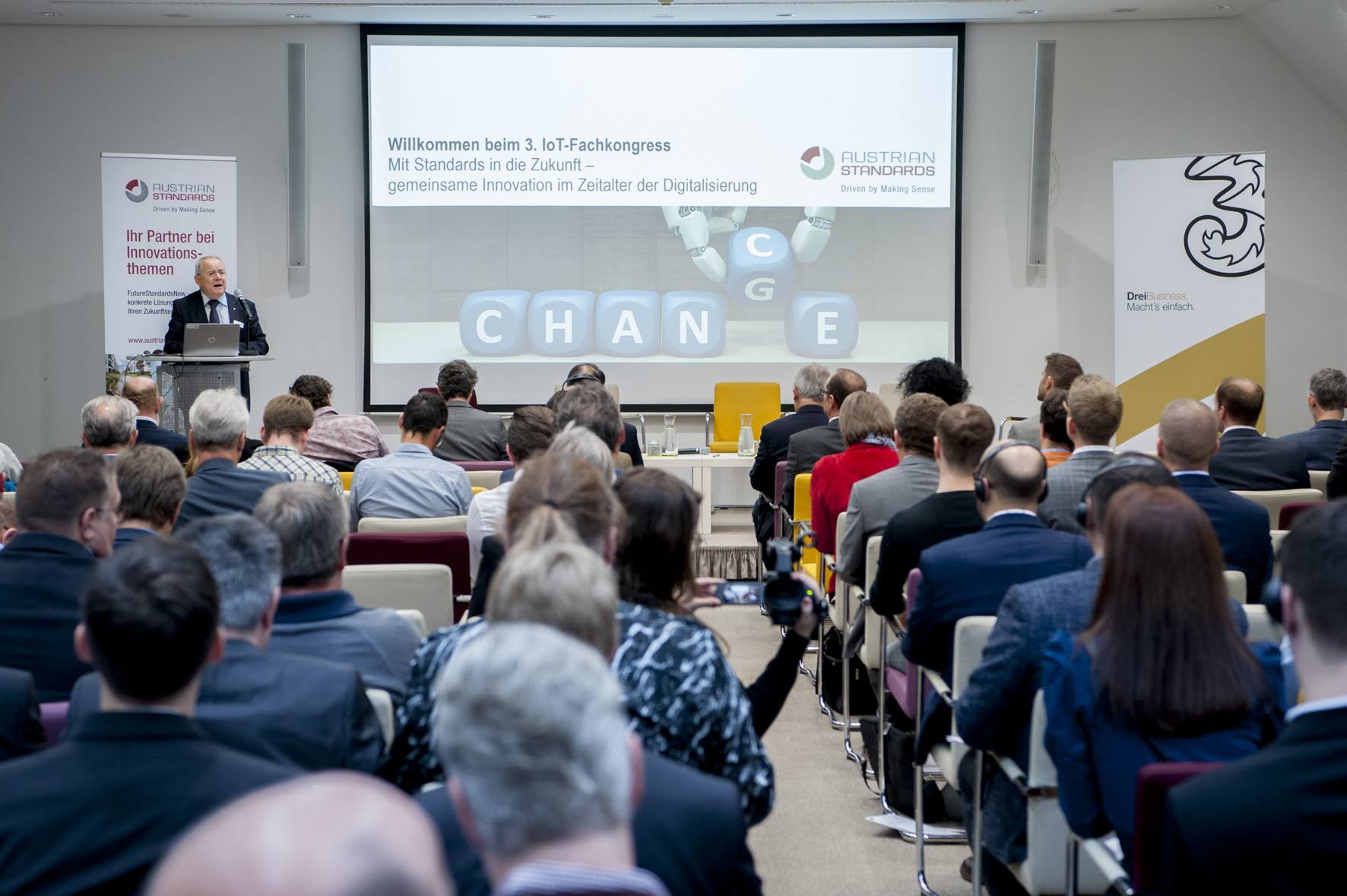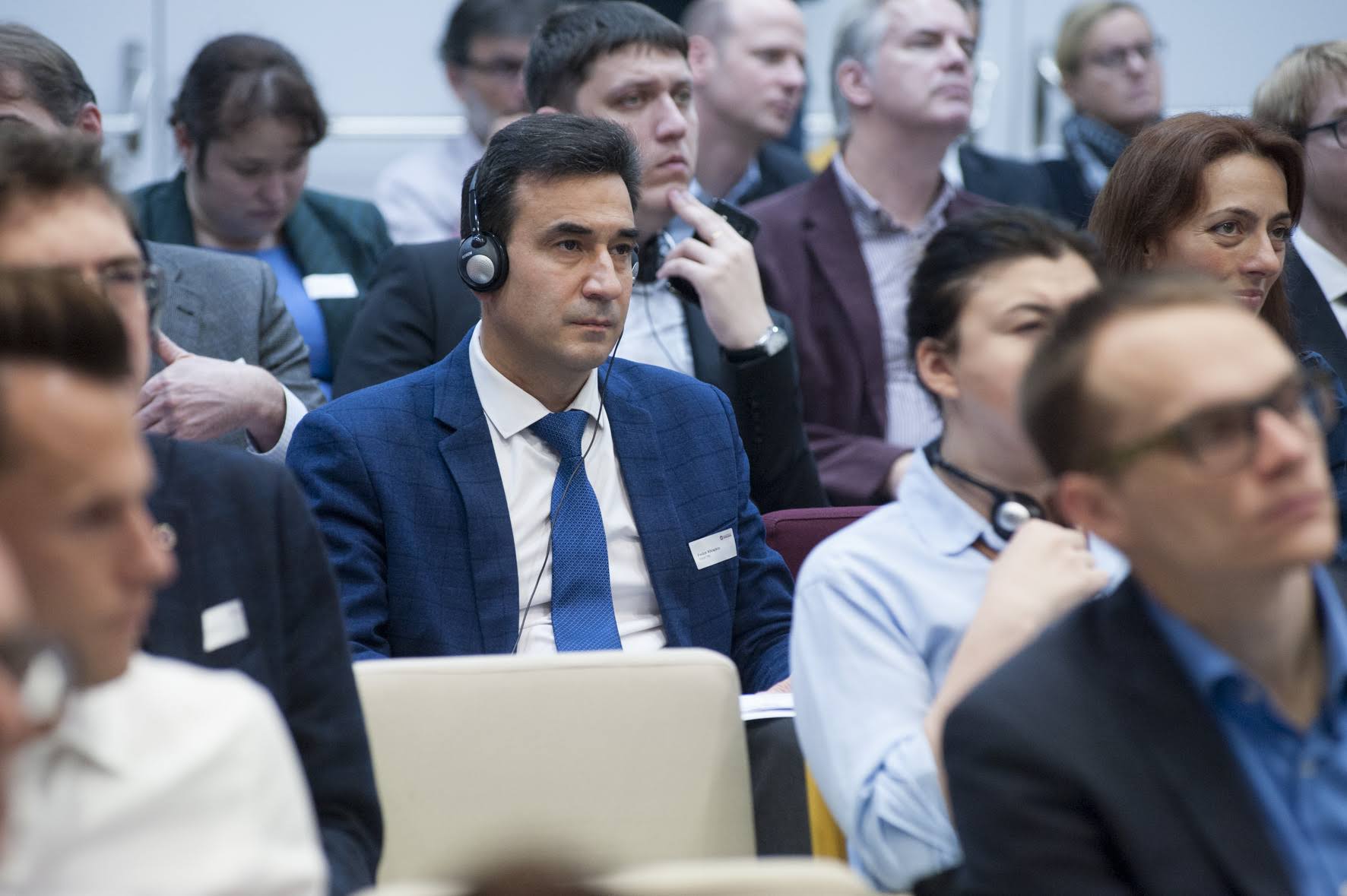From October 22 to 24 2019, the delegation of the RSPP Committee for technical regulation, standardization and conformity assessment visited Vienna. The Russian delegation included representatives of major Russian companies (PJSC Rostelecom, PJSC Metallinvest, JSC RZD), as well as leading universities and research institutes (FSUE Russian Technological University, VNIFTRI).

On October 23, Russian experts took part in the 3rd International Congress on the Internet of Things. The event was held at the Austrian Institute of Standards and brought together more than 100 specialists from the European Union.
The Congress was opened by Vice-President of the Austrian Institute of standards Dr. Manfred Matzka. He noted that the Austrian Standards Institute is interested in developing relations with Russia and the Russian industry, especially in the field of digital standards. Also in his speech, the speaker focused on the importance of involving students in the studying standardization and digital technologies.

The second report was made by the First Deputy Chairman of the RSPP Committee on technical regulation, standardization and conformity assessment, Chairman of the Council on technical regulation and standardization of the Russian Ministry of Industry and Trade Andrey Lotsmanov. He noted that the long-term fruitful cooperation between the RSPP Committee and the Austrian Institute of Standards allows to use the experience of Austria in the formation of legislation in the field of standardization in Russia. Effective interaction is facilitated, in particular, by the fact that Dr. Elisabeth Stampfl-Blaha, Director of the Austrian standards Institute, has long been an active participant in the Committee's activities. It is particularly important to develop relationships with European countries to share experience in the development of standards for the digital economy. For example, in 2018 at forum Innoprom signed an agreement on the establishment of the Council for technical regulation and standardization for the digital economy between the Committee and the Eastern Committee of the German economy, aimed at cooperation between Russian and German experts.

Dr. Christopher Franbeger, a leading researcher at the Technical University of Vienna, spoke about the prospects for the development of SMART technologies in Austria. As has shown the experience of the introduction of the EU Directive on the protection of personal data in Europe, if government officials do not work together with experts from industrial companies and scientific organizations in the development of legislation, then in the future this can lead to a large number of problems in the implementation of new legislative initiatives. It is very important to create an Advisory body in which representatives of the state and industry would participate.
Representatives of Hutchison Drei Austria Elizabeth Rettle and Martin Schwarzenger spoke about the 5 G technology. They noted that without common standards it is impossible to introduce new technologies, because production management systems simply will not "understand" each other.
Details about the participation of the Austrian Institute of Standards in the international standardization reported Dr. Joerg Nachbauer. Austrian experts actively participate in JTC 01 WG 42, CENELEC TC 13 technical Committee "Methodology for it security", ISO PC 42 "Artificial intelligence". He also mentioned the advantages of active participation in standardization:
-
You can suggest the development of a standard.
-
Get all information about standards.
-
Participate directly in the development of standards.
The representative of the Austrian Electrotechnical Commission Dr. Richard Valenta elaborated on specific examples of the work of experts in CENELEC TCs. Their activities are mainly focused on the development of the evidence base for the EU Radio Technology Directive. If we talk about the draft of standards in the development of which the Austrian Electrotechnical Commission is involved, these are, first of all, cybersecurity standards for the Internet of things.
At the end of the main presentations there was a discussion on "How the Internet of things changes our lives".
According to the moderator of the discussion, Ingrid Bedning, cooperation between experts at the international level may be very important today in the field of the Internet of things.
The discussion was attended by Dr. Christopher Franbeger, Dr. Clara Neppel from IEEE (Austrian Technical Center for the Study of Standards), Martina Paul from IT services.
Further, the Congress participants were invited to participate in the thematic session "Information and Artificial Intelligence".
The session was opened by Jürgen Schmidt, the CEO of the company STRG. He noted that the functioning of artificial intelligence is a new world, it operates on the principle of neural connections.

The next speaker was Balazs Bezhecki, CEO of BECKHOFF. He spoke about the creation of programs for artificial intelligence on the example of the company BECKHOFF.
Dr. Markus Triska, representing the Ministry of digital technologies of Austria, spoke about the methods used to develop artificial intelligence programs. There are two kinds of methods - symbolic and statistical. Each method has advantages and disadvantages. Symbolic methods are very visual, but difficult to implement. When using statistical methods, it is easy to build a model, but it is difficult to assess its effectiveness.
At the EU level, a long-term plan for Artificial Intelligence has been formed, aimed at coordinating programming languages and developing standards. At the same time, it is necessary to handle data very carefully, pay serious attention to their protection. Marcus Triska stressed the importance of using international standards in the field of artificial intelligence.
The first practical session, which took place in the afternoon, was devoted to Smart mobility. Key speakers were Thomas Stottan, CEO of Audio Mobil Electronic and Eva Tutchl-Unterberger, CEO of DigiTrans.
Smart-mobility refers to information and communication technologies that allow effective use of communication technologies to ensure the interaction of elements of a particular system with each other. One of the goals of Smart-mobility is to create the possibility of driving without the driver.
Certification of such vehicles in the digital environment has become an important issue. Now Austria has created a testing ground for cars from 6 parallel lanes to work out different scenarios of behavior of the car without a driver in urban traffic.

The second practical session was devoted to the issues of IT security and risk management. The session was opened by Thomas Bleier, CEO of B-SEC. He presented an overview of security standards for IT-technologies. According to the speaker, it is important that the standard has modern requirements for data protection, and there should be a person who is responsible for what requirements to include in the standard. Other key components are risk assessment, security architecture. He also outlined the main standards in the field of IT-security. For example, ISO 27001, ISO 27002, ISO 27005, IEC standards for industrial automation (IEC standards series 62443). At the national level, he is mentioned the BSI 200-1 series standards and CSF and SP series NIST standards (it focuses on system operation issues).
The topic was continued by Dr. Mario Drobic from the Center for digital security and IT-technology, who believes that security should be linked to trust and data protection.
At the end of the Congress, Marcus Petzl, managing partner of Destructive, made a report on virtual trials. The presentation was devoted to the development of access to content on the Internet.
A.N. Lotsmanov addressed the audience with the final word. He expressed confidence that the participation of representatives of Russian companies in the 3rd International Congress on the Internet of things is the next stage of cooperation between the RSPP Committee and the Austrian Institute of Standards. It is aimed at solving problems in the field of standardization for the digital economy.





On October 24, 2019, the Russian delegation visited the leading Austrian product testing authority-TUV Austria.
Rob Beckers, Vice President of TUV Austria, welcomed the Russian experts. He spoke about his company, especially noting the importance of cooperation with Russian enterprises. TUV Austria has recently opened its representative office in Russia, where today there are 20 auditors in various areas, which is a clear confirmation of the seriousness of TUV Austria's intentions in Russia. The company's clients have already become leading Russian companies-PJSC Gazprom, NOVATEK and others.
Dr. Preiss spoke about the test base and various laboratories of TUV Austria. Today, this organization is the leading European center for non-destructive testing and testing in the field of electromagnetic compatibility. TUV Austria specialists also carry out tests of railway track elements and locomotives.
TUV Austria pays special attention to cooperation with the Russian trade mission in Austria, whose representatives also took part in the meeting.
A new direction for the company was the creation of a "Pilot digital factory for Industry 4: 0". Alexandra Markis, innovation Manager, told more about this area of TUV Austria’s activity.
The Pilot factory for Industry 4: 0 is a joint project of TUV Austria and the Austrian University of Technology. It was established just over a year ago with the participation and support of leading Austrian and German industrial companies, including SIEMENS, DREI, BOSCH, REXROTE and others. Today, most scientific research is conducted in the field of studying the possibilities of interaction between robots and humans.
Stephanie Kirchhoff, head of international training programs at TUV Austria, devoted her report to the training programs for foreign specialists implemented at TUV Austria. Today, TUV Austria has developed and successfully implemented more than 2,000 different training programs, ranging in duration from 48 hours to several weeks. They mainly relate to training in the field of cybersecurity, industrial Internet of things, digitalization of production, application of it standards.
The Russian delegation visited three TUV Austria test laboratories. Domestic experts were demonstrated competence and capabilities in the field of testing methods of nondestructive testing, shown the test elements of railway rolling stock, conducted a detailed tour of the Pilot factory for Industry 4: 0, located at the Technical University of Vienna.
As a result of the visit, it was decided, with the support of the RSPP Committee and the Russian Trade mission in Austria, to establish closer cooperation with Austrian colleagues and to conduct a series of visits to TUV Austria aimed at developing cooperation in the field of railway transport and the oil and gas sector.


